可怕的杀戮乔治·弗洛伊德明尼阿波利斯警方在5月和愤怒的警察开枪布莱娜·泰勒三月,在全国范围内掀起了反对种族不公正和警察暴行的大规模抗议。
在接下来的几个月里,新老支持者黑人生活很重要(BLM)运动从东海岸到西海岸举行示威游行,新一代美国人抗议种族平等。
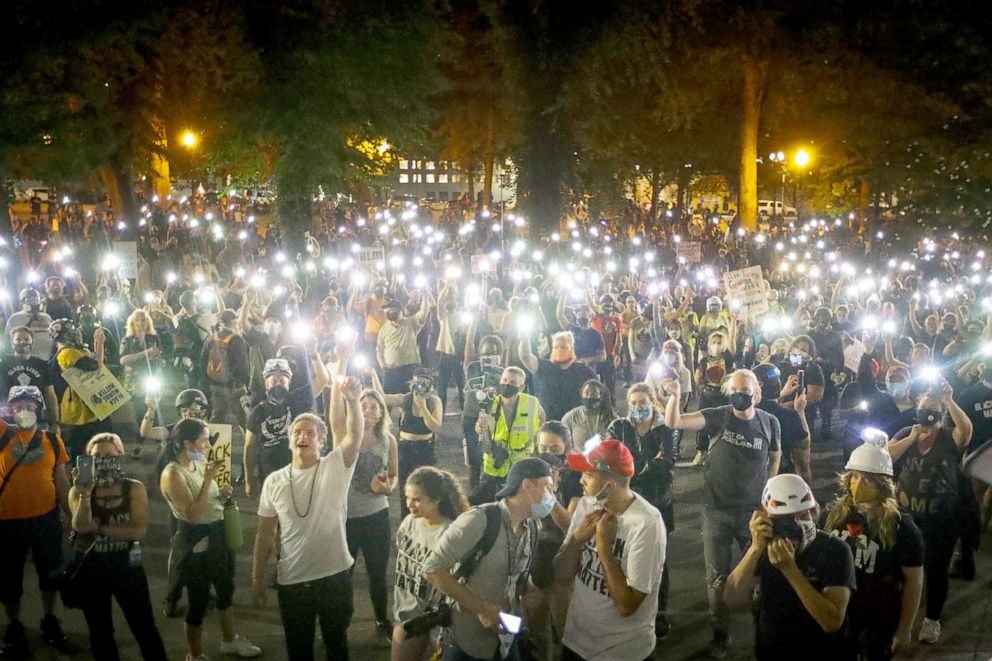
在俄勒冈州波特兰市的一次黑人生活事件抗议活动中,示威者举起手机灯高呼口号。,2020年7月29日。
从这部小说的巨大影响来看,在2020年总统竞选的最后几周,种族问题现在是全国讨论的中心冠状病毒大流行对有助于解决警察工作中种族差异的改革有所影响。
在两位候选人漫长的职业生涯中,这也是一个复杂的问题。前副总统乔·拜登通过选择一名黑人女性,卡玛拉·哈里斯作为他的竞选伙伴,并与美国第一位黑人总统并肩作战,创造了历史。
但他也因在20世纪70年代帮助结束学校隔离的商业立场和1994年的犯罪法案而招致批评,该法案导致了一个大规模监禁的时代。
特朗普在宣布竞选当天表示,墨西哥不会派遣最好的移民,包括“强奸犯”,这为他的总统任期定下了基调。随后,他呼吁禁止穆斯林移民,他揭露了反对巴拉克·奥巴马总统的“出生地怀疑”阴谋。他很大程度上忽视了最近几个月在全国爆发的种族动乱的根源。
与此同时,特朗普声称自己是种族主义最少的人,并吹捧他在总统任期内为非洲裔美国人创造的经济机会。
这里我们来看看特朗普和拜登在种族正义问题上的不同之处,以及他们在种族问题上所做的重要声明。
特朗普的麻烦
从2016年选举前开始,一直到他的总统任期,特朗普一再质疑巴拉克·奥巴马总统的公民权在没有证据的情况下,扩大了种族主义的虚假信息运动,旨在质疑美国第一位黑人总统的合法性。
2015年,特朗普参加总统竞选时表示,墨西哥正在输送犯罪、毒品和”强奸犯“去美国。在第一个任期内,特朗普继续寻求通过政策和言论点燃对“他人”的恐惧,以此来加强他的主要白人群体的支持。
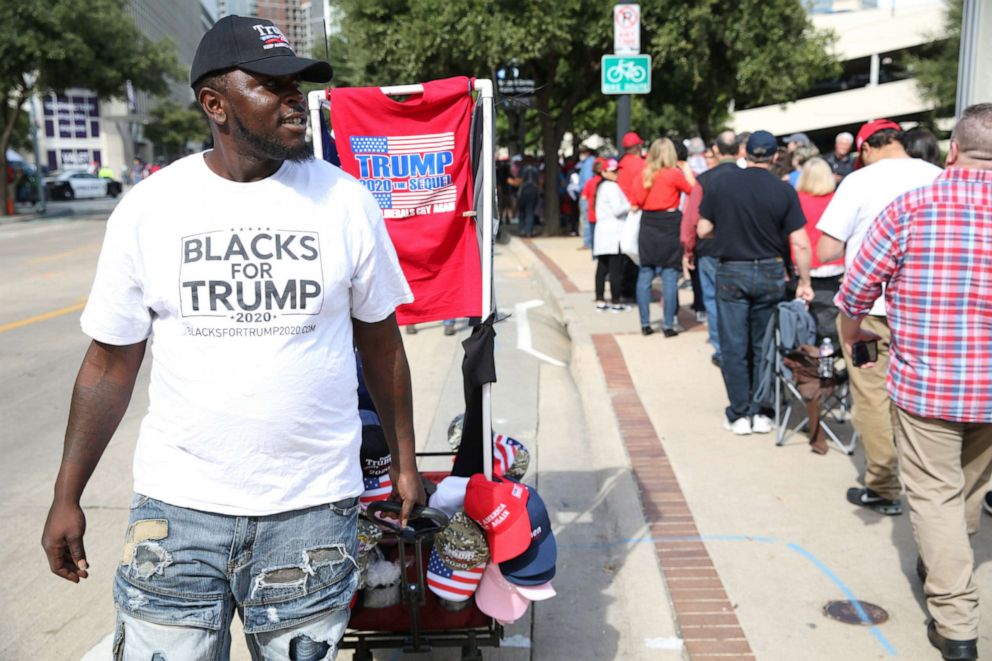
2019年10月17日,星期四,在美国德克萨斯州达拉斯市与美国总统唐纳德·特朗普的集会外,一名小贩穿着一件写有“黑人支持特朗普”的竞选t恤。
根据一项民意调查分析,在全国范围内,大约10%的黑人选民计划在2020年支持特朗普五点三十八分,类似于他在2016年得到的支持。退出轮询2016年的数据还显示,特朗普在那一年从黑人选民那里获得的支持超过了共和党前总统候选人米特·罗姆尼和约翰·麦凯恩。
2017年,特朗普发布行政命令,建立了一个旅行禁令来自穆斯林占主导地位的国家,最高法院最终支持这一版本。特朗普实施了他的旅行限制,理由是“出于国家安全考虑”易受恐怖袭击的国家。"
那年晚些时候,一名参与者白人至上主义集会特朗普在弗吉尼亚州夏洛茨维尔将自己的汽车撞向一群反抗议者时杀死了一名32岁的妇女,特朗普声称有“反抗议者”引起了强烈反对双方都很优秀。。“司机被发现了有罪的一级谋杀。
2018年,自称为最没有种族歧视的人描述了一个移民大篷车是对国家的暴力威胁,并称之为“一个侵略这与他在2016年竞选时关于移民的种族主义言论是一致的。
他还把目标对准了四名绰号为“黑人”的女议员小队”,建议销售代表亚历山大奥卡西奥-科尔特斯,纽约民主党,伊尔汉·奥马尔,D-Minn,Ayanna Pressley,D-Mass。和Rashida Tlaib密歇根州,所有人都“回到”他们“来自”的国家奥卡西奥-科尔特斯、普雷斯利和特拉伊布都出生在美国;奥马尔是一名索马里裔美国人,他作为难民移民,十几岁时成为美国人。
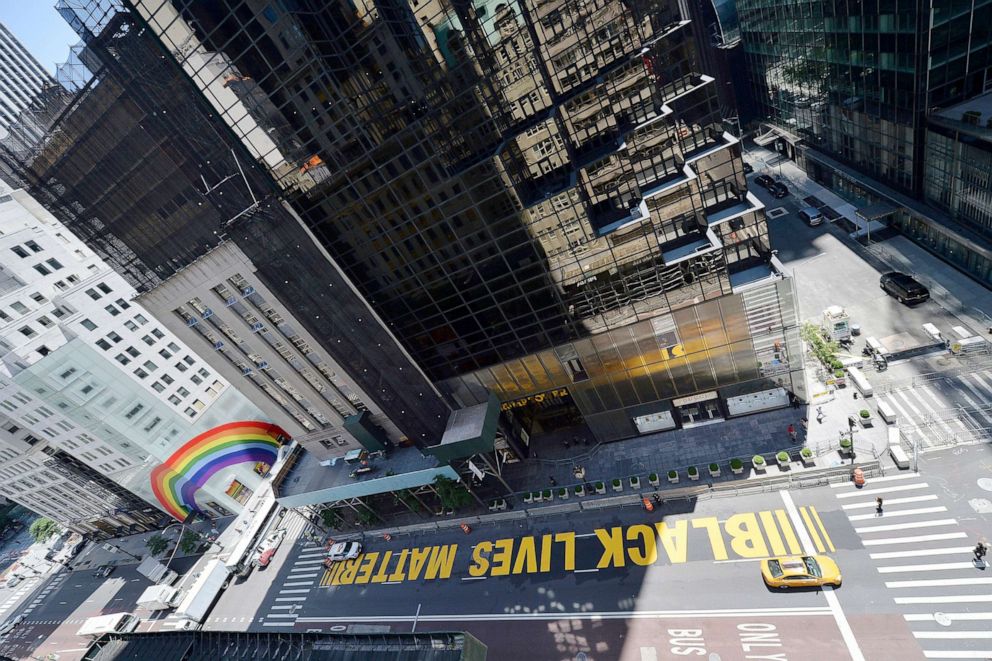
2020年7月14日,纽约第五大街特朗普大厦前,一幅“黑色生命至关重要”的壁画正在展出。
特朗普2020:修辞升温
随着2020年的竞争升温,分裂言论也随之升温。
2020年,特朗普打来电话黑人生活很重要"仇恨的象征“在推翻了一个奥巴马时代的住房规则旨在通过将资金与减少住房不平等联系起来来打击种族隔离。
这一言论呼应了1973年的一场联邦诉讼,在这场诉讼中,特朗普与他的父亲弗雷德一起被点名,并被指控歧视黑人房客他们在纽约的房产。双方最终达成和解,特朗普夫妇没有认罪。
为了吸引他的选民,特朗普在9月份向管理和预算办公室提出请求,要求停止在联邦工作场所进行反种族主义培训,称之为“反美宣传”。他后来签署了美国总统之行政命令将禁令扩大到与联邦政府做生意的承包商。该命令禁止教授“分裂概念”,例如白人特权,这是对美国白人固有优势的分析系统性种族主义,研究法律中包含的歧视性规则、做法和习俗。
几周后,特朗普发布了他的经济声明,反驳了这一命令”白金计划针对美国黑人,其中包括“多元化培训”。"
也是在9月,特朗普发表了一个黑暗和种族分裂言论国家档案馆利用支持者的恐惧和不安全感,他们认为呼吁种族平等是“试图摧毁”我们国家的“宝贵遗产”。他警告说,“对美国历史的讨伐是有害的宣传”,指的是批判种族理论,研究与种族有关的社会和文化《纽约时报》的1619项目从奴隶制的角度分析美国历史。那天他签署了一份推广令”爱国主义教育。"
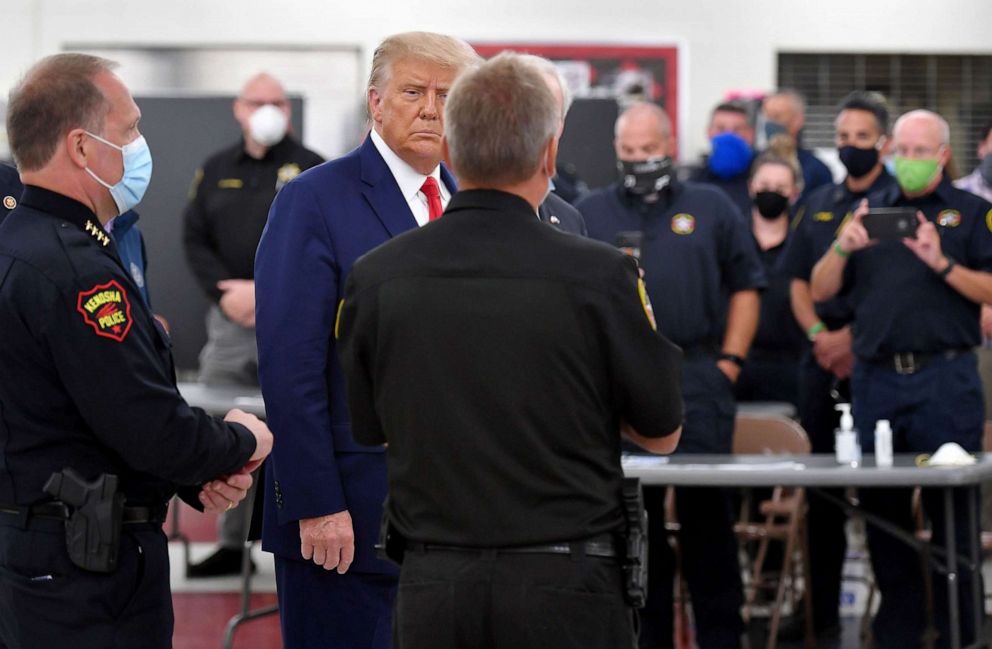
2020年9月1日,美国总统唐纳德·特朗普在威斯康星州基诺沙会见执法官员。
为了回应全国对杀害手无寸铁的黑人警方称,特朗普选择将自己标榜为“法律和秩序”总统,同时避免讨论抗议的根本原因,尽管他对一些遇难者的家人表示同情。他说抗议种族不公正的示威者是寻找麻烦“还有那个公司支持BLM的人是“弱者”,由“弱者”领导
他坚决反对剥夺警察部门资金的呼吁,并将“解散警察”运动称为“a”时尚。"
特朗普在监狱改革和经济方面的成就
特朗普拒绝承认系统性种族主义是美国的一个问题。然而,与特朗普严厉打击犯罪的言论不同,特朗普第一任期最大的立法成就之一是将两党协议签署为法律'第一步行动'2018年,该法案对监狱量刑法律进行了几十年来最全面的修改,特朗普表示将“回滚”比尔·克林顿总统1994年《犯罪法案》中对黑人社区影响过大的某些条款。
超过3,100名囚犯作为其颁布的一部分已经发布,包括爱丽丝·约翰逊,一位因非暴力毒品逮捕正在服无期徒刑的黑人祖母,最终被特朗普赦免。
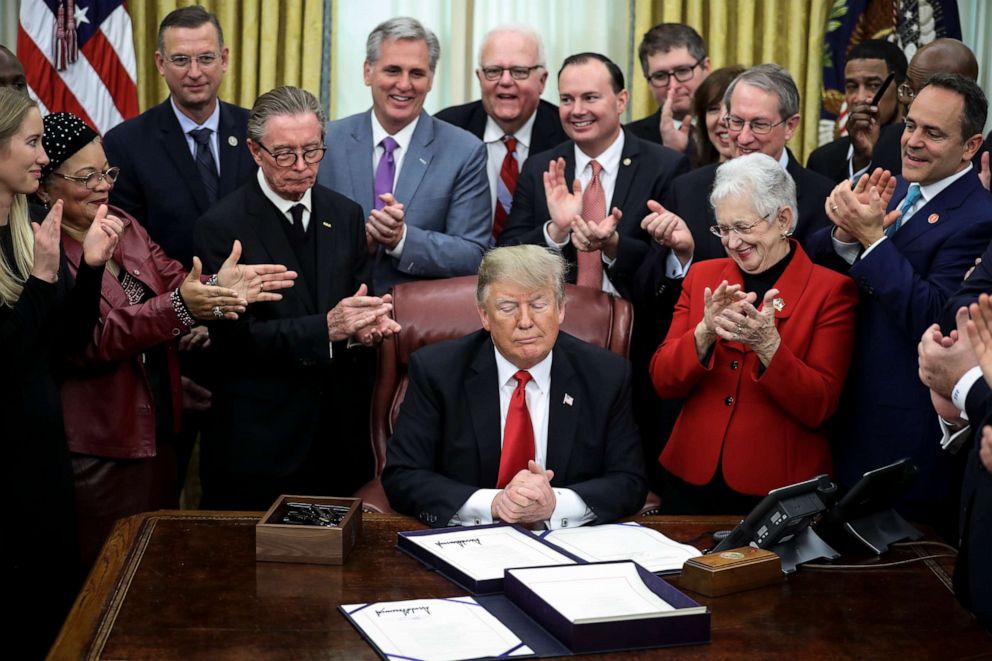
2018年12月21日,唐纳德·特朗普总统在白宫椭圆形办公室签署《第一步法案》和《少年司法改革法案》后,国会议员和嘉宾做出反应。
总统经常声称非裔美国人在他的领导下看到了最大的经济收益,但这是误导。根据a美联社的事实调查然而,在大流行爆发之前,美国黑人的失业率在特朗普政府时期确实达到了创纪录的低水平,在2019年8月达到了5.4%,但这一进展在很大程度上源于奥巴马政府时期从大衰退中复苏的经济。
美联社还援引人口普查局的数据称,2018年美国黑人的家庭收入中位数为41,361美元,低于2000年43,380美元的峰值。
当...的时候六月问道他计划如何解决司法系统中的系统性种族主义,总统说,当经济再次强劲时,它会自我愈合。
“顺便说一句,我们国家发生的事情,以及你现在看到的,已经发生的事情,是种族关系、非洲裔美国人社区、亚裔美国人、西班牙裔美国人、妇女和一切方面可能发生的最伟大的事情,”特朗普在6月被问及为什么他没有解决系统性种族主义的计划时说。“我们的国家如此强大,这就是我的计划。我们将拥有世界上最强大的经济。”
乔·拜登:黑人支持和一些批评的遗产
这位前副总统通过与第一位黑人总统并肩作战而创造了历史,也通过选择参议员Kamala Harris成为他的竞选伙伴,使她成为第一位获得主要政党提名的黑人女性。
拜登得到了大多数黑人社区的大力支持,他的提名在很大程度上归功于他在南卡罗来纳州的支持和他在那里的成功吉姆·克莱伯恩众议员的支持。
但他也发现自己受到了来自至关重要的投票集团的批评,这种批评可以追溯到他在2008年的竞选中担任先锋1994年犯罪法案,这导致了大规模监禁的增加,最近一次是在五月“你不是黑人”非洲裔美国选民在他和特朗普之间做出选择。他还因将非裔美国人社区与拉丁美洲人社区的多样性进行比较而面临反弹,暗示前者是一个整体。
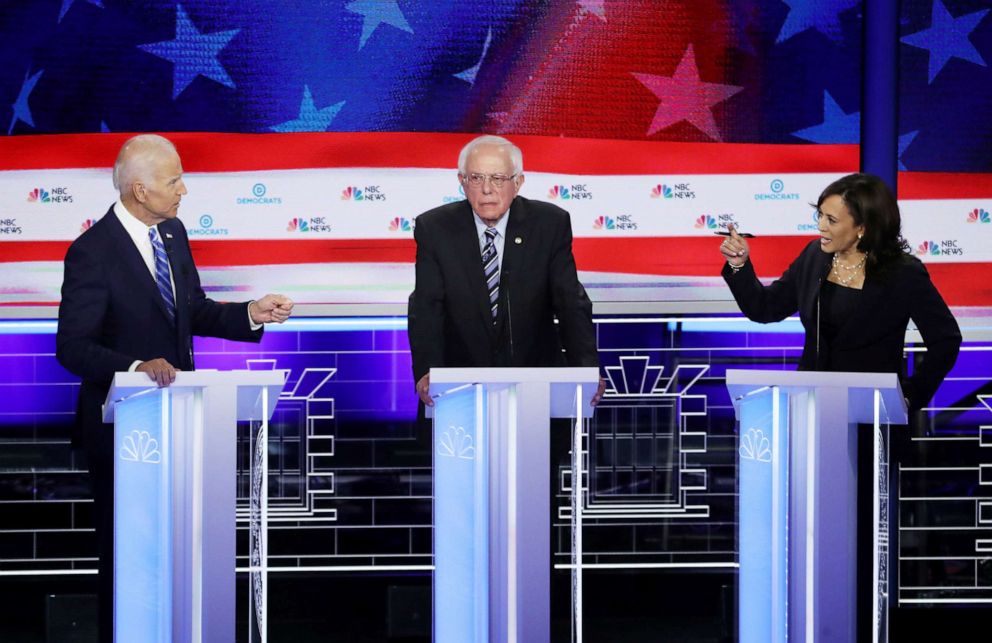
2019年6月27日,在迈阿密的第一次民主党总统辩论中,前副总统乔·拜登和参议员卡马拉·哈里斯在参议员伯尼·桑德斯的注视下交谈。
在一次热交换党初选辩论中与哈里斯的辩论中,拜登反对联邦授权的记录用校车接送学生引起了新的关注。1977年,拜登称之为“破产政策”在6月的辩论中,拜登声称哈里斯断章取义,并表示他支持志愿服务。
拜登在参议院任职期间还因与种族隔离的民主党人合作而受到抨击。他有重申他不同意他们的观点,“我的身体里没有种族歧视的骨头”
拜登还对奥巴马政府的移民政策表示遗憾,称其为“一个错误”大错特错“驱逐了成千上万没有犯罪记录的人。
拜登的计划和问题得到了拉美人的支持
然而,与他的对手不同的是,拜登承认存在系统性的种族主义,并发表了“反对种族主义的言论”拜登加强美国对正义承诺的计划,其重点是防止犯罪,消除种族差异,并为那些接触过刑事司法系统的人提供第二次机会。
拜登的计划是在今年的抗议活动之前提出的,呼吁结束私人监狱、现金保释和死刑,并将扩大司法部的权限,以解决警察和检察官的不当行为。它还将成立一个独立的工作队来解决歧视问题。
他也支持大麻合法化并自动删除那些被判犯有大麻相关罪行的人的记录。数据由美国公民自由联盟(美国公民自由联盟)显示,黑人因持有大麻而被捕的可能性是白人的四倍。
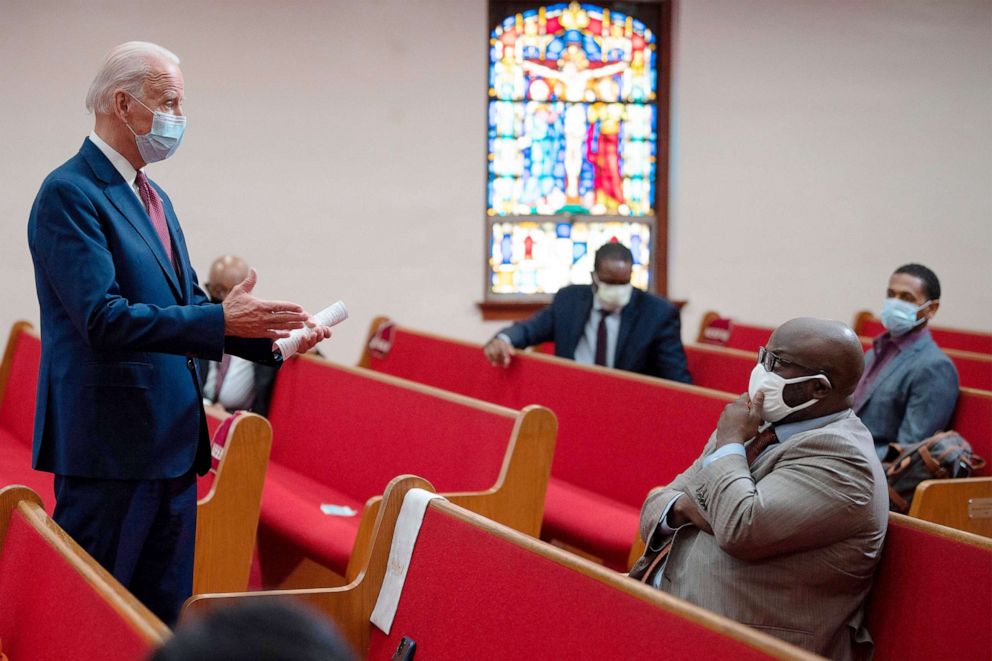
民主党总统候选人乔·拜登在参观德尔威尔明顿的贝瑟尔·AME教堂时会见了神职人员和社区活动人士。,2020年6月1日。
他的“重建得更好”政策的支柱集中在经济和包容性,特别是他将如何帮助黑人,拉丁美洲人和弱势群体。
虽然民调显示拜登在拉丁裔选民中领先特朗普,但拜登的竞选团队承认,它落后于希拉里·克林顿在2016年获得的支持,并因缺乏对拉丁裔社区的外联而受到批评。但该活动吹捧其多样化的员工,称46%的全职员工是有色人种。
拜登的竞选高级顾问说:“我们知道我们有工作要做,我们从一开始就说了。”西蒙·桑德斯在“本周”节目中告诉美国广播公司首席新闻主播乔治·斯特凡诺普洛斯
拜登接受了“黑人生活至关重要”的概念,并经常谈论该国的差异,告诉美国广播公司的罗宾·罗伯茨,有一个”基本差异“两个候选人之间在赛跑。
“事实是,两者之间有着根本的区别唐纳德·特朗普拜登对罗伯茨说:“我和他们都在谈论种族问题这是一个一生都在诋毁非裔美国人的人。诋毁他们,继续诋毁他们。什么都不做,只是追逐比赛,煽动比赛。把汽油倒在火上。"
9月27日美国广播公司新闻/华盛顿邮报对潜在选民的民意调查显示,平等对待种族群体是2020年选举的首要问题之一。当被问及他们会更信任谁来处理这个问题时,56%的人说拜登,而36%的人说他们会信任特朗普。
Trump vs. Biden on the issues: Racial justice
The horrific killing ofGeorge Floydby Minneapolis police in May and the fury over the police shooting ofBreonna Taylorin March set off massive protests across the country against racial injustice and police brutality.
Over the months that followed, new and previous supporters of theBlack Lives Matter (BLM)movement held demonstrations from coast to coast and a new generation of Americans protested for racial equality.
Demonstrators raise their cell phone lights as they chant slogans during a Black Lives Matter protest in Portland, Ore., July 29, 2020.
Race is now at the center of the national conversation heading into the final weeks of the 2020 campaign for president, from the disproportionate impact the novelcoronavirus pandemichas had on communities of color to reforms that would help address racial disparities in policing.
It has also been a complicated issue for both candidates over the course of their long careers. Former Vice PresidentJoe Bidenmade history by choosing a Black woman, Kamala Harris, to be his running mate and served alongside the nation's first Black president.
But he has also drawn criticism for his position on busing in the 1970's to help end segregation in schools and the 1994 crime bill, which helped lead to an era of mass incarceration.
Trump set the tone for his presidency when he said Mexico was not sending its best immigrants, including "rapists," on the day he announced his campaign. That was followed by a call to ban Muslim immigration, his perpetuation of the debunked "birther" conspiracy against President Barack Obama among other things. And he has largely ignored the sources of the racial unrest that has erupted around the country in recent months.
At the same time, Trump has claimed he is the least racist person and touted the economic opportunities he has created for African Americans during his presidency.
Here's a look at where Trump and Biden differ on the issue of racial justice, and significant statements they’ve made related to race.
Trump's troubles
Starting before the 2016 election and continuing into his presidency, Trump repeatedly questioned President Barack Obama'scitizenship, amplifying without evidence a racist disinformation campaign designed to call into question the legitimacy of the nation's first Black president.
In 2015, Trump entered the presidential race saying Mexico was sending crime, drugs and "rapists" to the United States. During his first term in office, Trump continued to seek to strengthen support among segments of his mostly white base by igniting fear of the “other” through policies and rhetoric.
A vendor wears a campaign t-shirt that reads "Blacks For Trump" outside a rally with U.S. President Donald Trump in Dallas, Texas, U.S., on Thursday, Oct. 17, 2019.
Nationally, roughly 10% of Black voters are planning to support Trump in 2020, according to an analysis of public polling byFiveThirtyEight, similar to the support he received in 2016.Exit pollingfrom 2016 also shows that Trump received more support from Black voters that year than previous GOP presidential nominees Mitt Romney and John McCain.
In 2017, Trump issued an executive order instituting atravel banfrom predominantly Muslim countries, a version of which was ultimately upheld by the Supreme Court. Trump implemented his travel restrictions citing national security concerns from “terror-prone countries.”
When later that year, a participant at awhite supremacist rallykilled a 32-year-old woman when he rammed his car into a group of counter-protesters in Charlottesville, Virginia, Trump drew backlash for claiming there were “very fine people on both sides..” The driver was foundguiltyof first-degree murder.
In 2018, Trump, who has called himself theleast racist person, depicted a migrant caravan as a violent threat to the country and called it an "invasion," in line with the racist rhetoric he campaigned on in 2016 regarding immigrants.
He’s also targeted the four Congresswomen of color nicknamed “The Squad,” suggesting that Reps.Alexandria Ocasio-Cortez,D-N.Y.,Ilhan Omar,D-Minn.,Ayanna Pressley,D-Mass. andRashida TlaibD-Mich., all “go back” to the countries “from which they came.” Ocasio-Cortez, Pressley and Tlaib were all born in the U.S.; Omar is a Somali-American who immigrated as a refugee and became an American as a teenager.
A "Black Lives Matter" mural is displayed directly in front of Trump Towers on 5th Avenue, New York, July 14, 2020.
Trump 2020: Rhetoric heats up
As the 2020 race heated up, so did the divisive rhetoric.
In 2020, Trump calledBlack Lives Matter“a symbol of hate” and also stoked racist fears after overturning anObama-era housing ruleintended to fight racial segregation by linking funding to the reduction of housing inequality.
The rhetoric echoed a federal lawsuit from 1973, in which Trump was named with his father, Fred, and accused ofdiscriminating against Black tenantsat their housing properties in New York. The parties ultimately reached a settlement without an admission of guilt from the Trumps.
In an attempt to appeal to his base, Trump made a request in September to the Office of Management and Budget to halt anti-racism training in federal workplaces, calling it “anti-American propaganda.” He later signed anexecutive orderexpanding the ban to contractors doing business with the federal government. The order prohibits the teaching of “divisive concepts” such aswhite privilege, which is the analysis of the inherent advantages a white person has in America, andsystemic racism, which examines discriminatory rules, practices and customs embedded in law.
Weeks later, Trump contradicted that order with the release of his economic “Platinum Plan” for Black Americans, which includes “diversity training.”
Also in September, Trump delivered a dark andracially divisive speechat the National Archives playing off of the fears and insecurities of supporters who believe calls for racial equality are “attempting to demolish” the “treasured and precious inheritance” of our nation. He gave a warning that the “crusade against American history is toxic propaganda,” referring tocritical race theory, the study of society and culture as they relate to race, andThe New York Times’ 1619 Projectthat analyzes U.S. history through the lens of slavery. That day he signed an order to promote “patriotic education.”
President Donald Trump meets with law enforcement officials in Kenosha, Wis.,Sept. 1, 2020.
In response to a national outcry over killings ofunarmed Black peopleby police, Trump has chosen to brand himself the “law and order” president while avoiding discussions about the root cause of the protests, despite expressing sympathy for the families of some of the people killed. He’s said demonstrators protesting racial injustice are “looking for trouble” and thatcompaniessupporting BLM are “weak” and led by “weak people.”
He’s a strict opponent to calls for stripping police departments of funds and called the “defund the police” movement a “fad.”
Trump accomplishments on prison reform and economy
Trump has refused to acknowledge that systemic racism is a problem in the United States. However, in a departure from his tough-on-crime rhetoric, one of the biggest legislative achievements of Trump’s first term was signing into law the bipartisan‘First Step Act’in 2018, which provided the most sweeping changes to prison sentencing laws in decades, and which Trump says will “rollback” certain provisions from President Bill Clinton’s 1994 Crime Bill that disproportionately affected the Black community.
More than3,100 inmateshave been released so far as part of its enactment, includingAlice Johnson, a Black grandmother who was serving a life sentence for a non-violent drug arrest and was ultimately pardoned by Trump.
Members of the Congress and guests react after President Donald Trump signed the First Step Act and the Juvenile Justice Reform Act in the Oval Office of the White House, Dec. 21, 2018.
The president often claims that African Americans have seen the most economic gains under his leadership, but that’s misleading. According to afact-check by the Associated Press, unemployment for Black Americans did reach a record low during the Trump administration at 5.4% in August 2019, before the pandemic struck, but much of that progress stemmed from the economic recovery from The Great Recession during the Obama administration.
The AP also cited that the median household income for Black Americans was $41,361 in 2018, below its peak of $43,380 in 2000, according to data from the Census Bureau.
Whenasked in Junehow he plans to address systemic racism in the justice system, the president said it will heal itself when the economy is strong again.
“By the way, what's happened to our country and what you now see, it’s been happening, is the greatest thing that can happen for race relations, for the African American community, the Asian American, the Hispanic American, for women, for everything,” Trump said in June after being asked why he doesn’t have a plan to address systemic racism. “Our country is so strong, and that’s my plan. We’re going to have the strongest economy in the world.”
Joe Biden: Legacy of Black support and some criticism
The former vice president, who made history by serving alongside the first Black president, also made history by selectingSen. Kamala Harristo be his running mate, making her the first Black woman to be a major party’s nominee.
Biden has strong support from much of the Black community, with his nomination due in large part to his support in South Carolina and his success there boosted byRep. Jim Clyburn’s endorsement.
But he's also found himself on the receiving end of criticism from the crucial voting bloc, ranging back to his spearheading of the1994 crime bill, which led to an increase of mass incarcerations, and most recently in May for saying“you ain’t Black”to African American voters deciding between him and Trump. He also faced backlash for comparing the diversity in African American communities to Latino communities, suggesting the former is a monolith.
Former Vice President Joe Biden and Sen. Kamala Harris and speak as Sen. Bernie Sanders looks on during the first Democratic presidential debate in Miami, June 27, 2019.
During aheated exchangewith Harris during a Democratic primary debate, Biden’s record on opposing federally mandatedbusingdrew new attention. In 1977, Biden called it a “bankrupt policy.” At the debate in June, Biden claimed Harris took his record out of context and said he supported voluntary busing.
Biden also drew fire for working with segregationist Democrats while he served in the Senate. He hasreiteratedthat he did not agree with their views and that "there's not a racist bone in my body."
Biden's also expressed regret over the Obama administration's immigration policy, calling it a "big mistake" to have deported thousands of people with no criminal records.
Biden's plan and issue with Latino support
Unlike his opponent, however, Biden does acknowledge systemic racism and has released the “Biden Plan for strengthening America’s Commitment to Justice,” which focuses on preventing crime, eliminating racial disparities and providing second chances for those who have had contact with the criminal justice system.
Biden’s plan, which was put forward before this year’s protests, calls for an end to private prisons, cash bail and the death penalty and would expand the Justice Department’s purview to address police and prosecutor misconduct. It would also institute an independent task force to tackle discrimination.
He also supports thedecriminalization of marijuanaand automatically expunging records for those who have been convicted of marijuana-related offenses. Data compiled by theAmerican Civil Liberties Union(ACLU) shows that Black people have been four times more likely than white people to be arrested for marijuana possession.
Democratic presidential candidate Joe Biden meets with clergy members and community activists during a visit to Bethel AME Church in Wilmington, Del., JUNE 1, 2020.
A pillar of his “Build Back Better” policies focuses on theeconomyand inclusion, specifically how he would help Black, Latino and disadvantaged communities.
While polling shows Biden with a lead over Trump among Latino voters, Biden’s campaign has acknowledged that it trails the support Hillary Clinton saw in 2016, and it has been criticized for lack of outreach to Latino communities. But the campaign has touted its diverse staff, saying 46%of full-time staff are people of color.
"We know we have work to do and we have said from the beginning,” Biden's campaign senior adviserSymone Sanderstold ABC News Chief Anchor George Stephanopoulos on "This Week."
Biden has embraced the concept of “Black Lives Matter” and often talks about disparities in the country, telling ABC’s Robin Roberts that there’s a “fundamental difference” between the two candidates on race.
“The truth is, there's a fundamental difference betweenDonald Trumpand me on the issue of race across the board,” Biden told Roberts. “This is a man who spent his entire career denigrating African Americans. Denigrating them, continuing to denigrate them. To do nothing but go after race and inflame it. Pour, you know, gasoline on the fire.”
A September 27thABC News/Washington Postpoll of likely voters shows that the equal treatment of racial groups is among the top issues in the 2020 election. When asked who they would trust more to handle that issue, 56% said Biden, while 36% said they would trust Trump.






